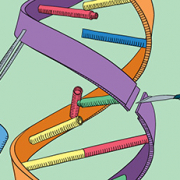Stories of rare disease: Introducing our new blog series
In honour of Rare Disease Day 2023, we’ll be sharing patients’ stories of living with rare disease and the role genomics has played in their journeys
Around 300 million people worldwide are living with a rare disease. In the UK, one in 17 people will be affected at some point in their lives – which means that over three million people are affected at any given time. If that sounds higher than expected, it’s worth remembering that although rare diseases might be individually rare, they are collectively common.
In October 2022, we launched our online course Genomics in the NHS: A clinician’s guide to genomic testing for rare disease, which takes learners on a journey along the rare disease pathway for genomic testing in the NHS. Along the way, we introduce some rare disease patients and their families and share their stories of living with rare disease – from the day-to-day lifestyle challenges to the frustrations of waiting for endless test results to the life-changing experience of receiving a genetic diagnosis after years without answers.
In honour of Rare Disease Day 2023 (28 February), we have gathered some of these patient stories into a blog series that shines a spotlight on what it’s really like to live with a rare disease. Starting tomorrow, we’ll introduce you to Aisha, Zainab, Melanie and Saskia, and Sara and Freya, with whom we’ll explore themes such as the importance of community when you or a loved one lives with a rare condition, and what it’s like when you receive a diagnosis from a genomic test even though you weren’t the original patient.
Check back tomorrow for the first story in the series, in which we’ll examine the impact that healthcare workers can have on a patient’s rare disease journey.
To learn more about how genomics can be applied in the diagnosis, treatment and prevention of rare disease, you can register for our online course or visit our rare disease education hub.
–









